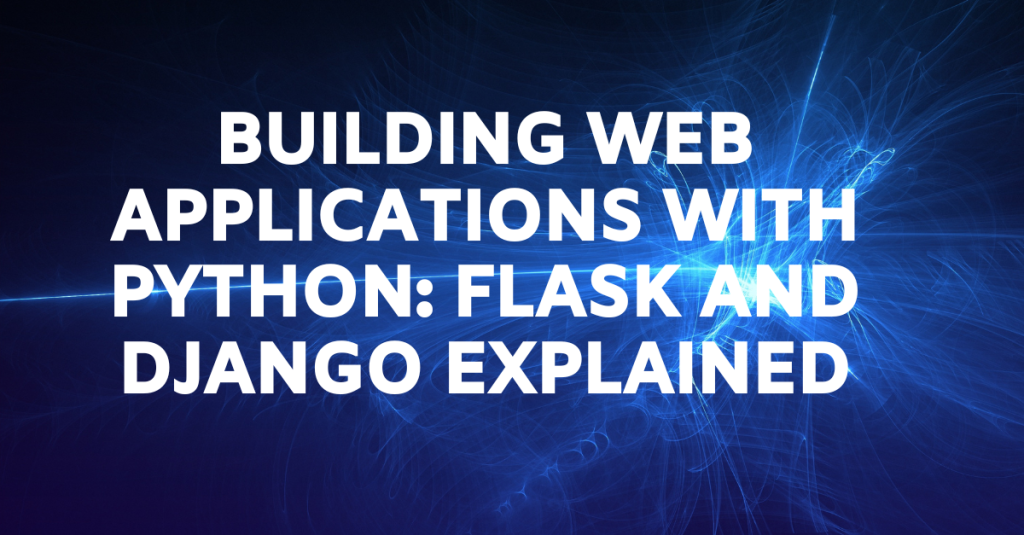Flask is commonly referred to as a micro-framework, which might be Building dynamic and feature-rich online apps is a vital need in today’s digital landscape, and Python has emerged as a powerhouse for this purpose. In this investigation into Python web programming, we dig into two outstanding frameworks: Flask and Django. Flask, frequently referred to as a “micro” framework, puts simplicity and adaptability first, making it a great option for smaller projects and people who prefer a hands-on approach. Django, on the other hand, which is renowned for its “batteries-included” concept, provides a robust toolbox suitable for sophisticated, large-scale applications while upholding strict norms for maintainability. We will analyze the benefits, use cases, and main differences of these Python frameworks so you can decide which one is ideal for your web development goals.ad you to think it’s missing key components. Flask is a strong tool that offers a minimalistic approach to web development, allowing developers to have complete control over every part of their application. Don’t let the “micro” moniker mislead you, though. Flask: Micro but Mighty Don’t be misled by the phrase “micro” framework when referring to Flask. Although Flask is simple, it has a lot of power for web development. Because of its lightweight nature, developers can create applications with significant flexibility, selecting the components and libraries they require. This makes Flask a fantastic option for quick prototyping and small to medium-sized projects. Flask gives developers the tools they need to easily create effective web apps thanks to its flat learning curve and extensibility through a wide range of extensions. Getting Started with Flask The flask is incredibly easy to set up. With just a few lines of code, you can create a simple web application. Flask Strengths Lightweight: Flask’s minimalistic design allows developers to add only the components they need. This makes it an excellent choice for small to medium-sized projects where simplicity is key. Flexibility: Flask doesn’t impose a specific project structure or database layer. You can choose your preferred libraries and database systems, giving you more freedom to design your application as you see fit. Learning Curve: Flask’s simplicity means it has a shallow learning curve, making it accessible to developers of all skill levels. It’s a great choice for beginners looking to get started with web development. Extensible: Flask has a vast ecosystem of extensions that can add functionality as needed. These extensions cover areas such as authentication, database integration, and more. Flask Use Cases Flask is an excellent choice for: Prototyping: Quickly create a functional prototype of your web application. API Development: Build RESTful APIs with ease using Flask’s lightweight structure. Small to Medium-sized Projects: Ideal for projects that don’t require the complexity of a full-stack framework like Django. Django: The Batteries-Included Framework The “batteries-included” framework Django provides a comprehensive approach to web development. It offers a comprehensive collection of integrated tools and conventions that speed up the development process. This controversial framework is especially well-suited for larger and more complicated online applications because it offers capabilities like an integrated ORM, authentication system, form handling, and an admin interface. Django is a great option for creating powerful, busy websites and applications that require a full, safe development environment because of its strong emphasis on security and scalability. Getting Started with Django Setting up a Django project requires a bit more initial effort than Flask, but it’s worth it for the features and structure it provides. Django Strengths Full-Featured: Django includes everything you need to build robust web applications, including an ORM (Object-Relational Mapping), authentication system, form handling, and an admin interface. Built-in Security: Django is known for its strong emphasis on security. It comes with built-in protection against common web vulnerabilities like SQL injection and cross-site scripting (XSS) attacks. Convention Over Configuration: Django follows the “Don’t Repeat Yourself” (DRY) principle and enforces a clear project structure. This helps maintainability and collaboration on larger projects. Scalability: Django can handle high-traffic websites and large datasets, making it a solid choice for enterprises and startups with plans for rapid growth. Django Use Cases Django is a strong candidate for: Large-scale Web Applications: Its built-in features and robust structure make it an excellent choice for complex web applications. Content Management Systems (CMS): Django’s admin interface is well-suited for building custom CMS solutions. E-commerce Platforms: Django’s scalability and security features make it a reliable choice for e-commerce websites. Key Differences Between Flask and Django Now that we’ve explored the strengths and use cases of both Flask and Django, let’s summarize the key differences between these two Python web frameworks: Complexity: Flask is simpler and more lightweight, making it easier for beginners and ideal for small to medium-sized projects. Django, on the other hand, is more complex but provides a comprehensive set of features for larger applications. Flexibility: Flask allows you to choose your components and libraries, offering more flexibility in your project’s architecture. Django, with its opinionated approach, provides less flexibility but streamlines development. Learning Curve: Flask has a lower learning curve due to its simplicity, while Django may require more time to grasp its extensive feature set and conventions. Security: Both Flask and Django take security seriously, but Django’s built-in security features provide an extra layer of protection, making it a preferred choice for applications with high-security requirements. Community and Ecosystem: Both frameworks have active communities and extensive ecosystems of extensions and packages. However, Django’s ecosystem is more focused on its core features and is tightly integrated. Which One Should You Choose? The choice between Flask and Django ultimately depends on your project’s requirements and your personal preferences as a developer. Here are some guidelines to help you make the right decision: Choose Flask if you need a lightweight, flexible framework for small to medium-sized projects, or if you prefer more control over your application’s structure and components. Choose Django if you’re working on a large-scale project that requires built-in features, scalability, and robust security. Django is also a great choice if you want to leverage its powerful admin interface or need to develop a CMS or e-commerce platform. In many cases, the choice may not be binary. Some developers even use both Flask and Django in the same project, utilizing each for its specific strengths. Conclusion Python stands for itself as a flexible language in the constantly changing field of web development, providing programmers with two unique routes through the Flask and Django frameworks. Flask is a great option for quick prototyping and smaller applications since it is straightforward and flexible, allowing for lots of customization. You can opt for Python course in Noida, Delhi, Pune and other parts of India. Django is the ideal option for complex, mission-critical applications due to its extensive feature set, strict rules, and strong security features. You now have the information to choose the best tool for your web development needs after exploring the advantages, use cases, and differences of various frameworks. Regardless of the route you take, Python’s active community and wide-ranging library base guarantee a successful journey towards building dynamic, potent online applications.








